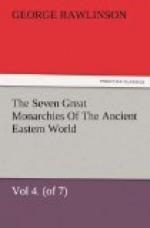Successful in his mediation, almost beyond his hopes, Nabopolassar returned from Asia Minor to Babylon. He was now advanced in years, and would no doubt gladly have spent the remainder of his days in the enjoyment of that repose which is so dear to those who feel the infirmities of age creeping upon them. But Providence had ordained otherwise. In B.C. 610—probably the very year of the eclipse—Psammetichus died, and was succeeded by his son Neco, who was in the prime of life and who in disposition was bold and enterprising. This monarch very shortly after his accession cast a covetous eye upon Syria, and in the year B.C. 608, having made vast preparations, he crossed his frontier and invaded the territories of Nabopolassar. Marching along the usual route, by the Shephilah and the plain of Esdraelon, he learned, when he neared Megiddo, that a body of troops was drawn up at that place to oppose him, Josiah, the Jewish king, regarding himself as bound to resist the passage through his territories of an army hostile to the monarch of whom he held his crown, had collected his forces, and, having placed them across the line of the invader’s march, was calmly awaiting in this position the approach of his master’s enemy. Neco hereupon sent ambassadors to persuade Josiah to let him pass, representing that he had no quarrel with the Jews, and claiming a divine sanction to his undertaking. But nothing could shake the Jewish monarch’s sense of duty; and Neco was consequently forced to engage with him, and to drive his troops from their position. Josiah, defeated and mortally wounded, returned to Jerusalem, where he died. Neco pressed forward through Syria to the Euphrates; and carrying all before him, established his dominion over the whole tract lying between Egypt on the one hand, and the “Great River” upon the other. On his return three months later he visited Jerusalem, deposed Jehoahaz, a younger son of Josiah, whom the people had made king, and gave the crown to Jehoiakim, his elder brother. It was probably about this time that he besieged and took Gaza, the most important of the Philistine towns next to Ashdod.
The loss of this large and valuable territory did not at once arouse the Babylonian monarch from his inaction or induce him to make any effort for its recovery. Neco enjoyed his conquests in quiet for the space of at least three full years. At length, in the year B.C. 605, Nabopolassar, who felt himself unequal to the fatigues of a campaign, resolved to entrust his forces to Nebuchadnezzar, his son, and to send him to contend with the Egyptians. The key of Syria at this time was Carchemish, a city situated on the right bank of the Euphrates, probably near the site which was afterwards occupied by Hierapolis. Here the forces of Neco were drawn up to protect his conquests, and here Nebuchadnezzar proceeded boldly to attack them. A great battle was fought in the vicinity of the river, which was utterly disastrous




